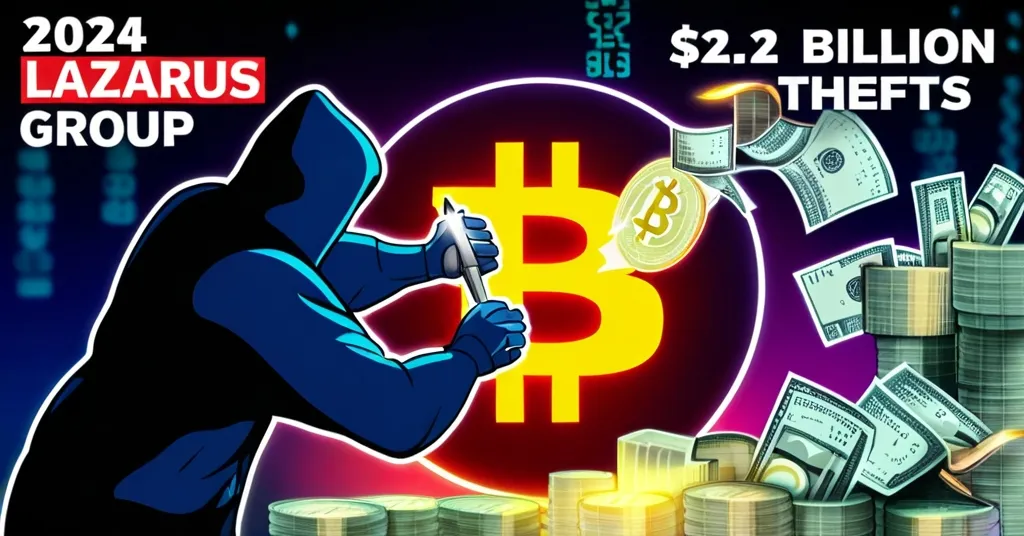Crypto Hacks Surge in 2024: $2.2 Billion Stolen, North Korea’s Lazarus Group Dominates

Crypto Lost $2.2 Billion to Hackers in 2024: Analyzing the Top 5 Hacks and Their Impact
Bitcoin’s ascent to over $100,000 in 2024 was overshadowed by a surge in hacking incidents, with cybercriminals making off with more than $2.2 billion in 303 attacks. This year saw a concerning rise in cyber theft, particularly from North Korean hackers, who intensified their digital heists. The spotlight on these hacks underscores the urgent need for enhanced security in the crypto world.
- $2.2 billion stolen by hackers
- 303 hacking incidents in 2024
- North Korean hackers stole $1.34 billion
- DMM Bitcoin hack led to platform closure
- Shift from DeFi to centralized services
According to Chainalysis, a leading blockchain analysis firm, the total amount stolen in 2024 marked a 21.07% increase from the previous year. This alarming rise in cybercrime casts a shadow over the otherwise thriving crypto market. North Korean hackers, particularly the notorious Lazarus Group, upped their game, stealing $1.34 billion across 47 incidents—a significant jump from the $660.5 million they pilfered in 2023. These state-sponsored cybercriminals are using their loot to fund North Korea’s nefarious activities, adding a geopolitical twist to the digital thefts.
The DMM Bitcoin hack stands out as a major blow, resulting in a loss of $305 million and the subsequent closure of the Japanese exchange by December 2024. The FBI confirmed that this hack was the work of North Korea’s Lazarus Group, also known as TraderTraitor, illustrating the international scope and sophistication of these cybercriminals. In a desperate attempt to recover, DMM Bitcoin took out massive loans, highlighting the financial strain such incidents impose on crypto platforms.
In India, the WazirX hack saw $235 million vanish from a multi-signature wallet. The theft led to the immediate suspension of services and the arrest of an individual linked to the exploit. As the VP of Cvyers Firm aptly put it, “Hackers are light years ahead,” emphasizing the ongoing battle to outsmart these digital ninjas.
“Hackers are light years ahead.” – Cvyers Firm VP
The PlayDapp exploit saw hackers make off with $290 million worth of PLA tokens from the crypto gaming and NFT platform. Meanwhile, the Orbit Chain hack in South Korea resulted in losses between $82 million and $100 million. Efforts to recover these stolen assets are ongoing, with Orbit Chain offering a reward of up to $8 million for information leading to their recovery and collaborating with international law enforcement.
The Radiant Capital exploit, another victim of North Korean hackers, saw a $58 million theft. This incident, linked to the Citrine Sleet group (also known as UNC4736), underscored the vulnerabilities in private key management across multiple blockchain networks. In fact, 43.8% of cryptocurrency thefts in 2024 were due to private key compromises, a stark reminder of the need for better security protocols.
Interestingly, 2024 marked a shift in hacker focus from decentralized finance (DeFi) platforms to centralized services. DeFi, or decentralized finance, refers to financial services built on public blockchains like Ethereum. This strategic pivot indicates that hackers are now targeting the larger pools of funds managed by centralized entities, exploiting vulnerabilities in private key management and security protocols. A multi-signature wallet, for instance, requires multiple private keys to authorize transactions, but even this security measure was breached in the WazirX hack.
As we look toward 2025, the crypto industry must bolster its defenses. The rise in hacking incidents, coupled with the looming threat of quantum computing, underscores the urgent need for robust security measures. The industry’s challenge is not just to keep pace with innovation but also to outsmart the increasingly sophisticated tactics of cybercriminals. This is especially crucial as Bitcoin and blockchain technology continue to champion decentralization, privacy, and disruption.
While the crypto community remains optimistic about Bitcoin’s potential to revolutionize finance, the reality of cyber threats cannot be ignored. The balance between embracing the benefits of decentralization and ensuring security is delicate but essential for the continued growth and adoption of cryptocurrencies. And let’s not forget, while we celebrate Bitcoin’s milestones, we must also keep a wary eye on those digital Robin Hoods who are outsmarting our security systems.
Key Takeaways and Questions
- What was the total amount of cryptocurrency stolen by hackers in 2024?
Over $2.2 billion was stolen through 303 hacking incidents.
- How did the number of hacking incidents in 2024 compare to 2023?
There was a 21.07% increase in hacking incidents, from 282 in 2023 to 303 in 2024.
- Which country’s hackers were most active in 2024, and how much did they steal?
North Korean hackers were most active, allegedly stealing $1.34 billion in 47 incidents.
- What was the impact of the DMM Bitcoin hack?
The DMM Bitcoin hack resulted in a loss of $305 million and led to the platform’s closure by December 2024.
- How did the WazirX hack occur, and what was the outcome?
The WazirX hack involved exploiting a vulnerability in a multi-signature wallet, resulting in a $235 million theft. The exchange suspended services, and an individual was arrested in connection with the hack.
- What techniques did hackers use to launder stolen funds?
Hackers used decentralized exchanges (DEXs), mixing services like CoinJoin, and bridging services to obscure the trail of stolen funds.
- Why did hackers shift their focus from DeFi to centralized services in 2024?
The shift indicates a tactical change to exploit vulnerabilities in centralized services, particularly related to private key management.
- What measures are being taken to recover stolen assets from the Orbit Chain hack?
Orbit Chain is collaborating with international law enforcement and offering a reward of up to $8 million for information leading to the recovery of stolen funds.
- What is the significance of the Radiant Capital exploit?
The exploit, linked to North Korean hackers, resulted in a $58 million theft and highlighted vulnerabilities in private key management across multiple blockchain networks.
- What are the implications for the crypto industry moving into 2025?
The industry must implement robust security measures to maintain user trust, especially in light of the evolving tactics of hackers and potential use of advanced technologies like quantum computing.



